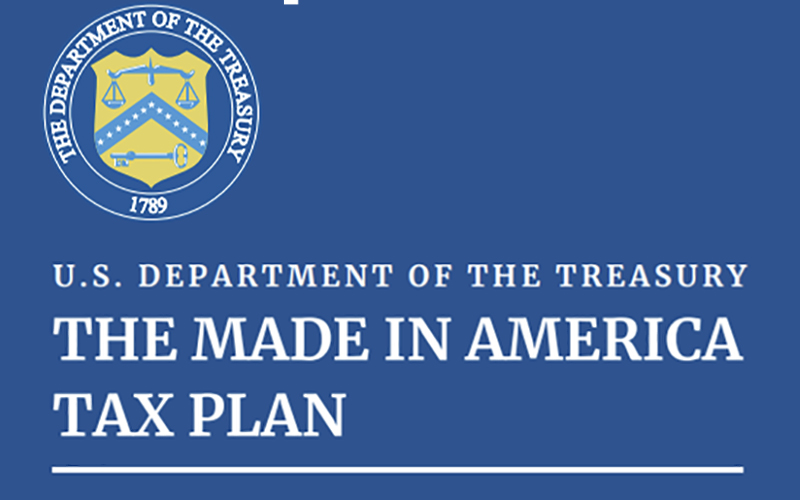From the U.S. Department of the Treasury –
President Biden in April proposed the American Jobs Plan, a comprehensive proposal aimed at increasing investment in infrastructure, the production of clean energy, the care economy, and other priorities. Combined, this plan would direct approximately 1 percent of GDP towards these aims, concentrated over eight years.
The goal of President Biden’s Made in America tax plan is to make American companies and workers more competitive by eliminating incentives to offshore investment, substantially reducing profit shifting, countering tax competition on corporate rates, and providing tax preferences for clean energy production. Importantly, this tax plan would generate new funding to pay for a sustained increase in investments in infrastructure, research, and support for manufacturing, fully paying for the investments in the American Jobs Plan over a 15-year period and continuing to generate revenue on a permanent basis.
To start, the plan reorients corporate tax revenue toward historical and international norms. Of late, the effective tax rate on U.S. profits of U.S. multinationals—the share of profits that they actually pay in federal income taxes—was just 7.8 percent. And although U.S companies are the most profitable in the world, the United States collects less in corporate tax revenues as a share of GDP than almost any advanced economy in the Organization for Economic Co-operation and Development (OECD).
At the same time, the U.S. corporate income tax system incentivizes shifting of profits and investment abroad—and allows other countries to undercut corporate tax rates here. For instance, a U.S. corporation making a physical investment abroad pays no U.S. tax on the first 10 percent return on foreign investment. And, both U.S. and foreign corporations still have substantial incentives to report profits in low tax countries and strip profits out of the United States; the latest data suggest that such profit shifting remains at record levels.
Lastly, the current system maintains a series of incentives that distort economic outcomes. Our tax system contains tax preferences for fossil fuel producers and lacks sufficient incentives for climate-change mitigation. In contrast, the Made in America tax plan contains tax provisions that incentivize clean energy. It also introduces new market-based incentives for corporate research and development expenditures, complementing the spending proposals advanced in the American Jobs Plan.
The President’s Made in America tax plan is guided by the following principles:
- Collecting sufficient revenue to fund critical investments. A primary objective of the Made in America tax plan is to promote competitiveness by funding critical new investments. Corporate tax revenues have fallen dramatically from 2 percent of GDP in the years before the Tax Cuts and Jobs Act (TCJA) to 1 percent in the years since the enactment of TCJA.
- Building a fairer tax system that rewards labor. In recent decades, the share of national income derived from labor has declined relative to that derived from capital. The plan would counter the incentives in our tax code that contribute to that trend.
- Reducing profit shifting and eliminating incentives to offshore investment. The enactment of a country-by-country minimum tax aims to substantially curtail profit shifting by U.S. multinational corporations. By tackling the profit shifting of foreign multinational companies out of the U.S. tax base, the plan works to level the playing field between multinational companies headquartered in the United States and foreign countries. The President’s plan would also eliminate the tax laws embedded in the 2017 TCJA that incentivize the offshoring of assets.
- Ending the race to the bottom around the world. Countries too often compete for multinationals’ business by reducing corporate tax rates which makes it difficult for the United States and other countries to meet revenue needs. The President’s plan provides a strong incentive for nations to join a global agreement that implements minimum tax rules worldwide through the denial of U.S. deductions on related party payments to foreign corporations residing in a regime that has not implemented a strong minimum tax. This aspect of the plan is designed to help level the playing field between foreign and U.S. companies.
- Requiring all corporations to pay their fair share. To ensure that large, profitable companies pay a baseline amount of taxes, the President’s plan would impose a minimum tax on firms with large discrepancies between income reported to shareholders and that reported to the IRS. It would also provide the IRS with resources to pursue large corporations who do not meet their tax obligations, reversing a trend toward fewer corporate audits.
- Building a resilient economy to compete. To complement initiatives in the American Jobs Plan that would change the path of energy production in the United States and provide resources for a new research and development agenda, the tax plan would end long-entrenched subsidies to fossil fuels, promote nascent green technologies through targeted tax incentives, encourage the adoption of electric vehicles, and support further deployment of alternative energy sources such as solar and wind power.
Read the Treasury Department’s full report on the Made in America Tax Plan at MadeInAmericaTaxPlan_Report.pdf (treasury.gov).
If you have questions regarding any business or personal tax matter, contact the experts at Kleshinski, Morrison & Morris CPAs for help. Call us at 419-756-3211, send an email to kmm@kmmcpas.com, or fill out our Contact Us form at this link.

